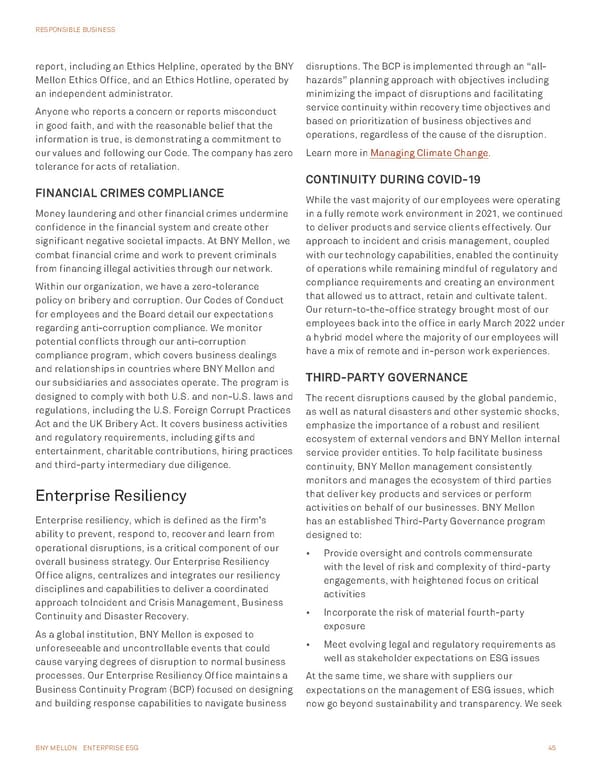BNY MELLON ENTERPRISE ESG 45 RESPONSIBLE BUSINESS report, including an Ethics Helpline, operated by the BNY Mellon Ethics Office, and an Ethics Hotline, operated by an independent administrator. Anyone who reports a concern or reports misconduct in good faith, and with the reasonable belief that the information is true, is demonstrating a commitment to our values and following our Code. The company has zero tolerance for acts of retaliation. FINANCIAL CRIMES COMPLIANCE Money laundering and other financial crimes undermine confidence in the financial system and create other significant negative societal impacts. At BNY Mellon, we combat financial crime and work to prevent criminals from financing illegal activities through our network. Within our organization, we have a zero-tolerance policy on bribery and corruption. Our Codes of Conduct for employees and the Board detail our expectations regarding anti-corruption compliance. We monitor potential conflicts through our anti-corruption compliance program, which covers business dealings and relationships in countries where BNY Mellon and our subsidiaries and associates operate. The program is designed to comply with both U.S. and non-U.S. laws and regulations, including the U.S. Foreign Corrupt Practices Act and the UK Bribery Act. It covers business activities and regulatory requirements, including gifts and entertainment, charitable contributions, hiring practices and third-party intermediary due diligence. Enterprise Resiliency Enterprise resiliency, which is defined as the firm’s ability to prevent, respond to, recover and learn from operational disruptions, is a critical component of our overall business strategy. Our Enterprise Resiliency Office aligns, centralizes and integrates our resiliency disciplines and capabilities to deliver a coordinated approach toIncident and Crisis Management, Business Continuity and Disaster Recovery. As a global institution, BNY Mellon is exposed to unforeseeable and uncontrollable events that could cause varying degrees of disruption to normal business processes. Our Enterprise Resiliency Office maintains a Business Continuity Program (BCP) focused on designing and building response capabilities to navigate business disruptions. The BCP is implemented through an “all- hazards” planning approach with objectives including minimizing the impact of disruptions and facilitating service continuity within recovery time objectives and based on prioritization of business objectives and operations, regardless of the cause of the disruption. Learn more in Managing Climate Change . CONTINUITY DURING COVID-19 While the vast majority of our employees were operating in a fully remote work environment in 2021, we continued to deliver products and service clients effectively. Our approach to incident and crisis management, coupled with our technology capabilities, enabled the continuity of operations while remaining mindful of regulatory and compliance requirements and creating an environment that allowed us to attract, retain and cultivate talent. Our return-to-the-office strategy brought most of our employees back into the office in early March 2022 under a hybrid model where the majority of our employees will have a mix of remote and in-person work experiences. THIRD-PARTY GOVERNANCE The recent disruptions caused by the global pandemic, as well as natural disasters and other systemic shocks, emphasize the importance of a robust and resilient ecosystem of external vendors and BNY Mellon internal service provider entities. To help facilitate business continuity, BNY Mellon management consistently monitors and manages the ecosystem of third parties that deliver key products and services or perform activities on behalf of our businesses. BNY Mellon has an established Third-Party Governance program designed to: • Provide oversight and controls commensurate with the level of risk and complexity of third-party engagements, with heightened focus on critical activities • Incorporate the risk of material fourth-party exposure • Meet evolving legal and regulatory requirements as well as stakeholder expectations on ESG issues At the same time, we share with suppliers our expectations on the management of ESG issues, which now go beyond sustainability and transparency. We seek
 BNY Mellon ESG Report Page 44 Page 46
BNY Mellon ESG Report Page 44 Page 46